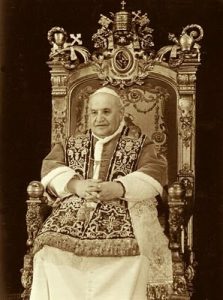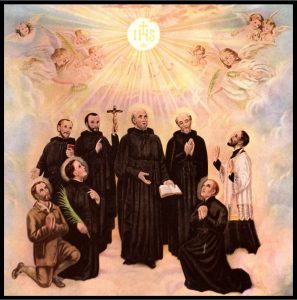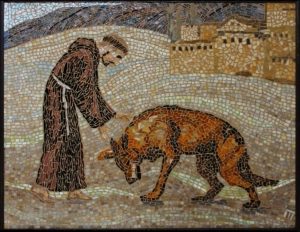Praising God as the angels, really
North American Martyrs
St Luke
 “Luke’s Gospel is marked by a special concern for the poor, the marginalized, women, and social outcasts. His account of the nativity, with its stress on the faith of Mary, emphasizes the humbleness of Jesus’ birth and its significance in fulfilling the hopes of the poor. It is in Luke’s Gospel that Jesus preaches, “Blessed are the poor” and where we find the parable of the rich man and the poor beggar Lazarus, offering such a striking image of the relation between mercy and justice in this life and in the life to come.”
“Luke’s Gospel is marked by a special concern for the poor, the marginalized, women, and social outcasts. His account of the nativity, with its stress on the faith of Mary, emphasizes the humbleness of Jesus’ birth and its significance in fulfilling the hopes of the poor. It is in Luke’s Gospel that Jesus preaches, “Blessed are the poor” and where we find the parable of the rich man and the poor beggar Lazarus, offering such a striking image of the relation between mercy and justice in this life and in the life to come.”
– Blessed Among Us, by Roger Ellsberg, p. 600.
Pastors need to face humanity
In life I wonder desire to know what is going on in reality. By what authority do pastors admit when they are in front of other people? The person in the hospital bed, the husband about to be without a job, the student about to be dismissed from university studies because she committed an act of plagiarism, the senior person facing dementia and cancer? What is the occasion for pastoral leadership and by what light is reality judged (evaluated) and addressed? Is it ideology or reality? Too often the clergy are without a method, or a reasonable measure of leadership or a substantial spiritual life.
Pope Benedict XVI, in his message to the Presidents of Europe’s 34 Episcopal Conferences, exhorted them “not to be afraid of facing up to the present-day pastoral challenges, being in position to listen to the concrete conditions of man’s personal and social life, ready to proclaim the Gospel of hope to all. The Gospel is a light entrusted to Christians of the third millennium so that, through a courageous and credible witness it may give light to the whole house (cf. Mt 5,15)“.
Pro-Life is to be pro-Liturgical Life
A recent article by Peter Kwasniewski, “Why pro-life Catholics should strive for a higher and deeper life” caught my attention and I think you ought to read it.
Kwasniewski states,
“…to be pro-life in its most profound sense is to be pro-liturgical life. As the Second Vatican Council says about the baptized: “Participating in the Eucharistic sacrifice, the source and culmination of the whole Christian life, they offer the Divine Victim to God, and offer themselves along with It” (Lumen Gentium §11). “The liturgy is the summit toward which the activity of the Church is directed; at the same time, it is the font from which all her power flows” (Sacrosanctum Concilium §10). The font from which all her power flows … The power to welcome children, to love them into the Church, to care for them over all the years; the power to value every human person, well or ill, hale or handicapped, conscious or comatose, embryonic or elderly; the power to build a culture of life, a culture of beauty, a culture of intellect consecrated to the truth—all this flows from the Holy Mysteries. Without the Church’s liturgy, we fail to grasp the infinite dignity God has bestowed on us in Christ. We miss out on the flesh-and-blood encounter with the Source of Life, Life incarnate, Life outpoured for eternal life.
“Correctly understood, then, the pro-life movement is pro-human life, pro-intellectual life, pro-cultural life, and pro-liturgical life. When we see this movement in its full breadth and depth, we see the prerequisites of our vision, the scope of our struggle, the source of our strength, and the glorious destiny of our toil.
Read the entire article here.
St. John XXIII, pope
 Today is the liturgical memorial of St. John XXIII. This is the first time the universal Church is permitted to observe this feast. He was the beloved Servant of the Servants of God.
Today is the liturgical memorial of St. John XXIII. This is the first time the universal Church is permitted to observe this feast. He was the beloved Servant of the Servants of God.
Here is the opening prayer for the Novus Ordo Liturgy.
Almighty and eternal God, who in the Pope, Saint John XXIII, gave to the whole world the shining example of a good shepherd, grant that, through his intercession, we may with joy spread abroad the fullness of Christian charity.
Through our Lord Jesus Christ, your Son, who lives and reigns with you in the unity of the Holy Spirit, one God, for ever and ever.
St Francis of Assisi
Today is the feast of St Francis of Assisi.
One aspect of the saint’s life is his role a as a peacemaker. To illustrate this role is the story of Francis meeting the angry wolf in the town of Gubbio. According to the narrative the wolf terrorized animals and people alike.
According to the Fioretti, the principal collection of stories of the saint’s life,
“Francis placed his hope in the Lord Jesus Christ, master of all creatures. Protected neither by shield or helmet, only arming himself with the sign of the Cross, he bravely set out of the town with his companion, putting his faith in the Lord who makes those who believe in him walk without injury on an asp … and trample not merely on a wolf but even a lion and a dragon.”
Some local peasants followed the two brothers, keeping a safe distance. Finally the wolf saw Francis and came running as if to attack him. The story continues:
“The saint made the sign of the Cross, and the power of God . . . stopped the wolf, making it slow down and close its cruel mouth. Then Francis called to it, ‘Brother Wolf, in the name of Jesus Christ, I order you not to hurt me or anyone.”
The wolf then came close to Francis, lowered its head and then lay down at his feet as though it had become a lamb. Francis then censured the wolf for its former cruelties, especially for killing human beings made in the image of God, thus making a whole town into its deadly enemy.
“But, Brother Wolf, I want to make peace between you and them, so that they will not be harmed by you any more, and after they have forgiven you your past crimes, neither men nor dogs will pursue you anymore.”
The wolf responded with gestures of submission “showing that it willingly accepted what the saint had said and would observe it.”
Francis promised the wolf that the people of Gubbio would henceforth “give you food every day as long as you shall live, so that you will never again suffer hunger.” In return, the wolf had to give up attacking both animal and man. “And as Saint Francis held out his hand to receive the pledge, the wolf also raised its front paw and meekly and gently put it in Saint Francis’s hand as a sign that it had given its pledge.”
Francis led the wolf back into Gubbio, where the people of the town met them in the market square. Here Francis preached a sermon in which he said calamities were permitted by God because of our sins and that the fires of hell are far worse than the jaws of a wolf which can only kill the body. He called on the people to do penance in order to be “free from the wolf in this world and from the devouring fire of hell in the next world.” He assured them that the wolf standing at his side would now live in peace with them, but that they were now obliged to feed him every day. He pledged himself as “bondsman for Brother Wolf.”
After living peacefully within the walls of Gubbio for two years, “the wolf grew old and died, and the people were sorry, because whenever it went through the town, its peaceful kindness and patience reminded them of the virtues and holiness of Saint Francis.”
Is it possible that the story is true? Or is the wolf a storyteller’s metaphor for violent men? While the story works on both levels, there is reason to believe there was indeed a wolf of Gubbio. A Franciscan friend, Sister Rosemary Lynch, told me that during restoration work the bones of a wolf were found buried within the church in Gubbio.
Francis became, in a sense, the soldier he had dreamed of becoming as a boy; he was just as willing as the bravest soldier to lay down his life in defense of others. There was only this crucial difference. His purpose was not the defeat but the conversion of his adversary; this required refusing the use of weapons of war because no one has ever been converted by violence. He always regarded conversion as a realistic goal. After all, if God could convert Francis, anyone might be converted.
“They are truly peacemakers,” Saint Francis wrote in his Admonitions, “who are able to preserve their peace of mind and heart for love of our Lord Jesus Christ, despite all that they suffer in this world.”
— an extract from Ladder of the Beatitudes by Jim Forest
Prayer for the time of fatigue
Adrienne von Speyr’s Prayer for the time of fatigue
Dear Lord, I am too tired to pray. And you certainly know from the Cross how great fatigue can be. I ask you to let all your angels and saints so adore you that no break in adoration results. Amen.
A fitting prayer on today’s feast of the Guardian Angels.
Pope Francis’ prayer intention for October
Pope Francis’ prayer intention for October:
That all workers may receive respect and protection of their rights, and that the unemployed may receive the opportunity to contribute to the common good”
The Pope said,
We should always remember the dignity and rights of those who work, condemn situations in which that dignity and those rights are violated, and help to ensure authentic progress by man and society. Let us pray that all workers may receive respect and protection of their rights, and that the unemployed may receive the opportunity to contribute to the common good.


